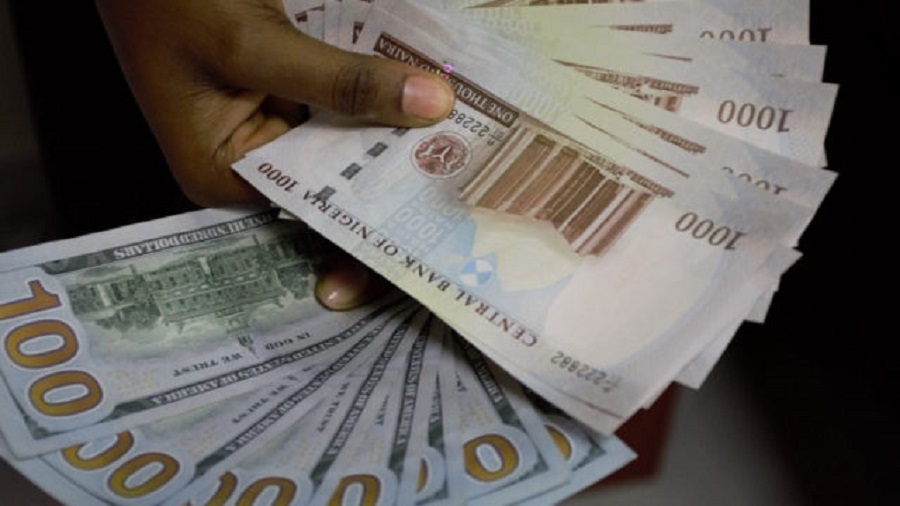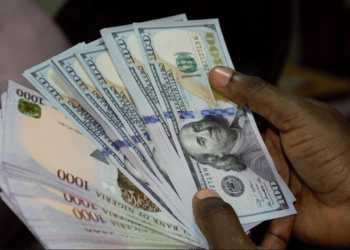Friday, 2nd July 2021: The exchange rate between the naira the US dollar closed at N411.25/$1 at the Investors and Exporters window, where forex is traded officially.
Naira depreciated against the US dollar on Friday, having lost 55 kobo to close at N411.25/$1 compared to N410.7/$1 recorded on Thursday, 1st July 2021.
The local currency fell at the official market despite the dollar supply rising significantly by 128.2%.
Meanwhile, the naira was stable at the parallel market, as it closed at N503 to a dollar. This was the same that was recorded in the previous trading session. Also, Nigeria’s external reserve continues to plunge, as it heads to its lowest position in four years and a year-to-date decline of over $2 billion.
READ: Naira weakens at NAFEX window as dollar supply continues to dwindle
Trading at the official NAFEX window
Naira depreciated against the US dollar at the Investors and Exporters window at Friday’s trading session to close at N411.25/$1 as against the N410.7/$1 recorded at the end of trade on Thursday, 1st July 2021. This represents a 55 kobo drop.
- The opening indicative rate closed at N411.98 to a dollar on Friday, 2nd July 2021, this represents a 77 kobo drop when compared to the N411.21 to a dollar that was recorded the previous trading day.
- An exchange rate of N420.95 to a dollar was the highest rate recorded during intra-day trading before it settled at N411.25/$1, while it sold for as low as N394/$1 during intra-day trading.
- Meanwhile, forex turnover at the Investors and Exporters (I&E) window rose significantly by 128.2% on Friday, 2nd July 2021.
- According to data tracked by Nairametrics from FMDQ, forex turnover increased sharply from $61 million recorded on Thursday, 1st July 2021 to $139.23 million on Friday, 2nd July 2021.
READ: Oil prices inch higher as OPEC+ expresses optimism ahead output cut decision
Cryptocurrency watch
The world’s most popular and biggest cryptocurrency, Bitcoin, dropped by 0.87% on Sunday evening to close at $34,387.05
- Wealthy investors look to be making a comeback into the Bitcoin market, a blockchain metric that warned of a price drop in early May shows.
- The number of coins held by whale entities – clusters of addresses controlled by a single network participant holding 1,000 to 10,000 BTC – rose by over 80,000 to 4.216 million BTC on Friday, hitting the highest level since May.
- The tally remained largely unchanged on Saturday, according to data provided by Glassnode.
- Meanwhile, China continues its efforts to thwart Bitcoin mining within the country, forcing major mining operations to move overseas or shut down completely.
- Ethereum, the second-largest cryptocurrency by capitalization rose by 2.49% to close at $2,268.46.
- Despite the ban on crypto transactions in Nigeria, it appears Nigerians are still very much in the business of trading in cryptos and especially Bitcoin.
- According to a report from CoinDance, Nigeria traded a total of 60,215 Bitcoins worth over $566 million between 2015 and 2020, with many Nigerians now trading through P2P channels.
READ: Naira depreciates across forex markets as crypto investors lose over $40.35 billion
Oil prices
The crude oil market was bearish on Sunday evening, as Brent Crude recorded a 0.13% drop to close at $76.07 per barrel ahead of another round of critical OPEC+ discussions to break a stalemate over raising production, with tension rising over the weekend between two long-time allies.
- The United Arab Emirates on Friday blocked an OPEC+ deal that cartel leaders Russia and Saudi Arabia hashed out to increase output, demanding better terms for itself.
- After 2 days of bitter negotiations, and with the UAE the only holdout, ministers suspended the discussions until Monday, leaving markets in limbo as oil prices still remained above $76 a barrel.
- Meanwhile, higher crude oil prices have prompted cash-strapped U.S. refiners to look for alternative ways to maximize gasoline production during the peak of the summer driving season.
- Brent crude jumped more than 8% last month, capping a powerful first-half rally, aided by a steady demand recovery in key economies including the U.S, Europe and China.
- Vitol Group, the world’s largest independent oil trader, expects the crude rally to continue on the assumption any OPEC+ output hikes will fail to keep pace with growth in demand.
- WTI Crude also dropped by 0.16% to close at $75.04, Natural gas gained by 0.43% to close at $3,716, Bonny Light recorded a decline of 0.60% to close at $74.16 per barrel, while OPEC basket rose by 1.68% to close at $74.84.
External reserve
Nigeria’s external reserve declined by $44 million on Thursday, 1st July 2021 to stand at $33.28 billion. This represents a 0.13% decrease compared to the $33.324 billion recorded on Wednesday.
- Nigeria’s foreign reserve fell to its lowest position since October 2017, as its year-to-date decline surpasses $2 billion, while its monthly decline for June 2021 stood at $905.5 million. This is despite the recent bullish trend recorded in the global oil market.
- The decline can be attributed to a drop in inflows by foreign investors and a decrease in forex earnings due to a cut in crude oil export as a result of OPEC production quota, as well as the widening international trade deficit. This invariably puts a lot of pressure on the local currency.
- However, the expectation of an increase in the global demand for crude oil and the hope of a rise in production quota by OPEC could reduce the pressure on Nigeria’s external reserve.
- The CBN, which operates a managed float foreign exchange system, also periodically supports the currency using the external reserves, and a lower reserve is expected to affect the currency.






















